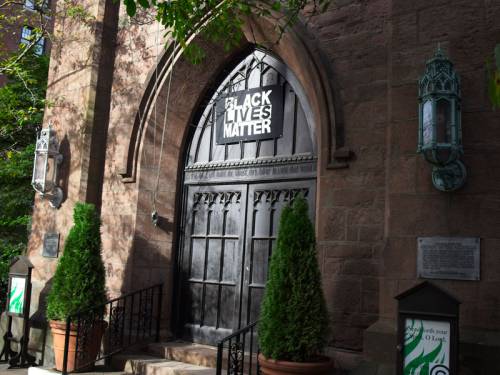Challenging church leadership to take a stand on racial issues
August 1, 2021
 My church has always been a place that has taught me the importance of loving your neighbor. To love your neighbor, though, you must stand up for your neighbor. This is a core value at Highland Presbyterian Church in Louisville, and one we practice daily. But there was one additional step my church needed to take in 2020 — and it was one that we struggled with.
My church has always been a place that has taught me the importance of loving your neighbor. To love your neighbor, though, you must stand up for your neighbor. This is a core value at Highland Presbyterian Church in Louisville, and one we practice daily. But there was one additional step my church needed to take in 2020 — and it was one that we struggled with.
Our session discussed, but initially decided against, posting a Black Lives Matter lawn sign outside of the church building. We opted instead for a “No Justice, No Peace” sign. As a new member of the session, I was disheartened as the objections from older members were based on the premise that “all lives matter.” Some worried, too, that the congregation would be uncomfortable with a Black Lives Matter lawn sign. Louisville was one of the forefronts of Black Lives Matter protests last summer sparked by the fatal shooting of Breonna Taylor by police in March 2020. Wasn’t it our duty as a church to stand with those suffering from injustice, and not to safeguard our own comfort?
When Philando Castile was shot and killed by police in July 2016 in a suburb of St. Paul, Minnesota, I was 12 years old. It was impossible to avoid the video of his death and the heartfelt stories that emerged afterward. I am now 17, and the fight for racial equality is the movement of my generation. We are growing up hearing about it daily, and it is something we are getting tired of listening to. I will never understand what it’s like to be Black in America, but I can ensure that the places that I attend — often places of influence and privilege — recognize the disadvantages endured by Black Americans, Indigenous Americans and all people of color.
Following that session meeting, members of my youth group shared that they were also disheartened that the Black Lives Matter sign was not approved. I brought the matter up for consideration again. The objections were still there. One member was adamant that “all lives matter” and that we should not differentiate.
I used a commonly quoted but effective analogy to make my case. Let’s say there is a house on fire in your neighborhood. The fire department begins putting water on the burning home. Your insistence that all lives matter would be like insisting the fire department put water on all the homes even though only one of them is burning.
Luckily, the conversation didn’t shut down. People asked questions. The tone of the conversation switched when I shared that the youth of the church had been disappointed with the session’s original decision. The member with the strongest objection has a granddaughter close to my age, and he began considering a young person’s viewpoint.
In the end, he voted in favor of the sign, changing all the votes to “yes.” The sign was approved. This is an important step in truly becoming an inclusive beloved community, and it is crucial for those in the church to stand up for all.
Helpful Tip:
Having healthy conversations
Tough conversations are often part of building a beloved community, as Abby Sekula discovered with her proposal of posting a Black Lives Matter lawn sign in front of her church. Here are some of the guidelines created by the Presbyterian Peacemaking Program for engaging in healthy conversations:
- Learn about various positions on the topic of disagreement.
- State what you think you heard and ask for clarification before responding.
- Focus on ideas and suggestions instead of questioning people’s motives or intelligence.
- Seek to stay in community with each other though the discussion may be full of tension.
- Be sensitive to the feelings of those who do not agree with the majority.
Abby Sekula, Ruling Elder, Highland Presbyterian Church, Louisville
Let us join in prayer for:
PC(USA) Agencies’ Staff
Catherine Reuning, Mission Specialist, Theology & Worship, Presbyterian Mission Agency
Sue Rheem, Presbyterian Rep. to the UN, Compassion, Peace & Justice, Presbyterian Mission Agency
Let us pray
God of all, it is our greatest joy to give you thanks and praise. Open our hearts to the movement of your Spirit though all the landscapes of our lives. Guide us to be your hands and feet as we faithfully serve in a world of need. Amen.


No comments:
Post a Comment